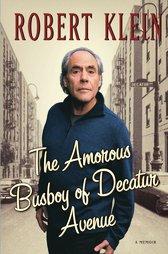
The Amorous Busboy of Decatur Avenue. Robert Klein
The Amorous Busboy of Decatur Avenue is Robert Klein's memoirs of growing up in the Bronx in the 1950s. Born in 1942, Klein writes affectionately of the basic influences of his youth during the years 1951 to 1966. Each chapter begins with a picture of Klein during the period discussed.
His parents were children of immigrant Jews who were "careful, cautious, wary people" and passed on their concerns to Klein and his sister. His bedroom was a Castro convertable ottoman in the living room of their small 6th floor apartment.
The first four chapters cover his life in junior high and high school in the Bronx. Having grown up in the Bronx myself during this time, I found these very well written and full of delightful details.
The next five chapters are about his life at Alfred University in rural upstate New York. Here he confronts anti-Semitism and develops a love of acting and comedy. He also works summers in the Catskill Mountain resorts made famous in the movie Dirty Dancing. He is no Patrick Swayze, and his amorous nature is mostly unfulfilled.
The last six chapters tell the story of his breaking into show business. His first success in Chicago's Second City and his friendship with Rodney Dangerfield are highlights of this section.
One of the recurring themes of the work is his sexual relations over time. Beginning with his losing his virginity to a 112th Street prostitute, Klein reminisces about the women in his life and the sexual and sometimes loving relations he had with them. Although he is not very graphic in his descriptions, this male oriented portrayal of sex in the 50s and early 60s may seem insensitive by modern standards. Yet it is his very honesty at representing the male attitudes of the time that makes this aspect of the book especially interesting. He says he writes "not to titillate but to communicate the excitement that sex held for me and its importance in my life." This was a time of great changes in sexual attitudes and his depictions of his and his friends' sexual interests over these 16 years shows how radical the change was.
All in all this is a wonderful memoir of New York life in the 1950s. It is also an insightful portrayal of college life at the time, especially in an era when Jews were still being discriminated against in fraternities and other aspects of academia. Lastly, Klein does a great job of describing his beginning career as an actor. How he learned his craft, the problems he faced, and the people he knew are all well represented.
No comments:
Post a Comment